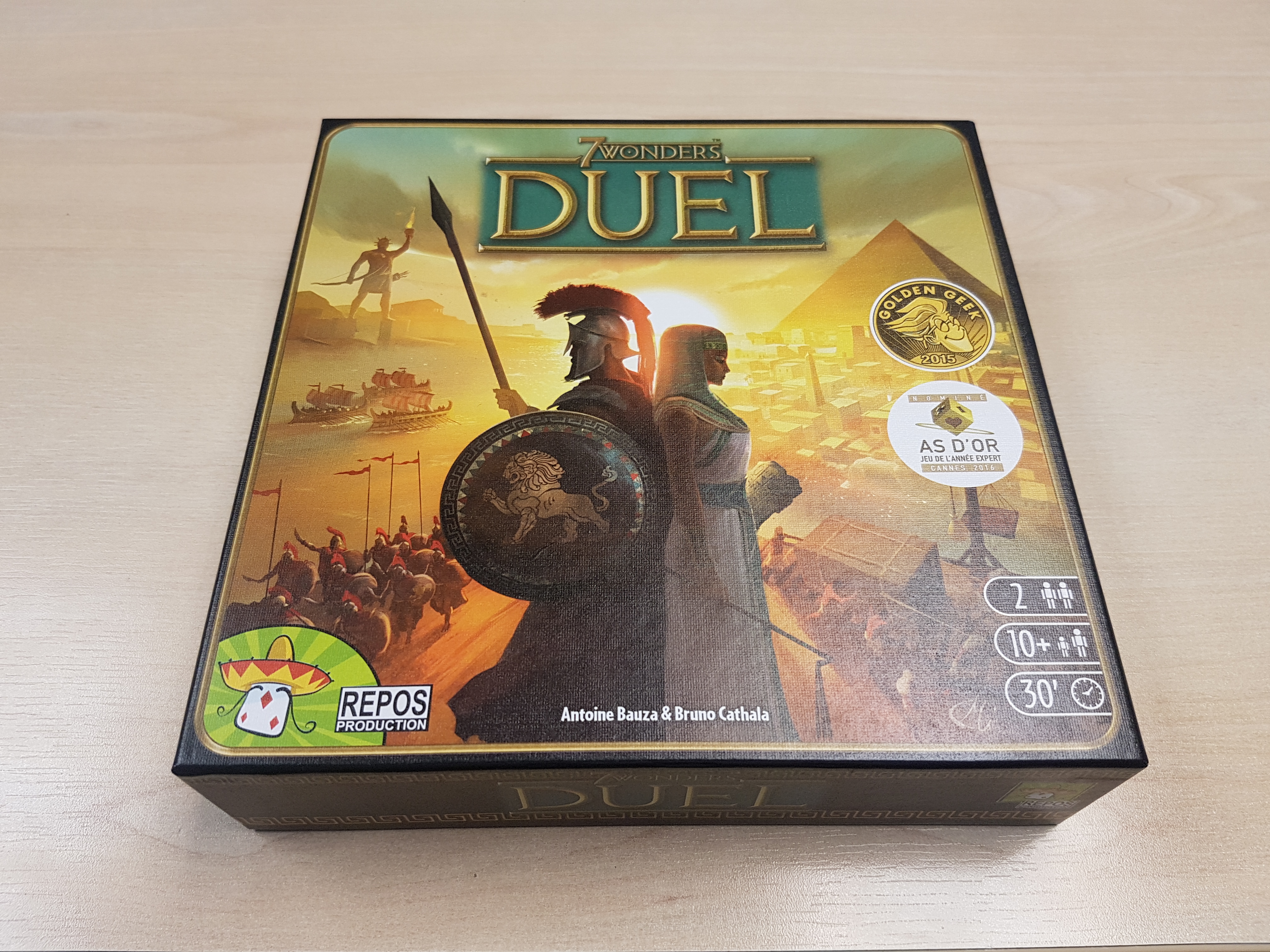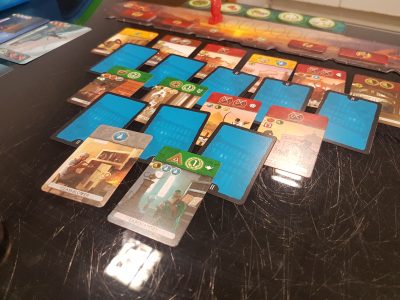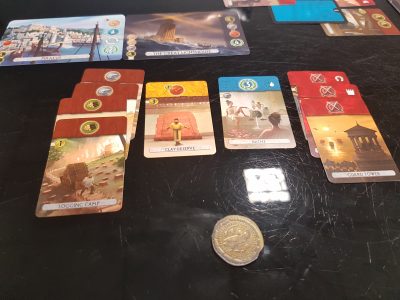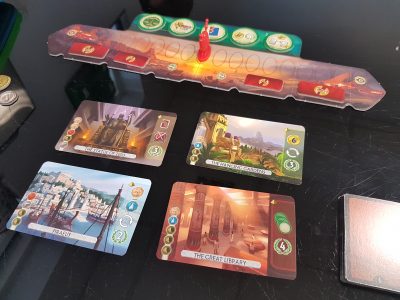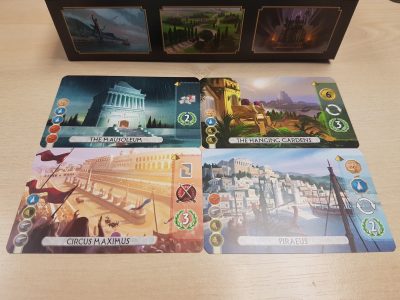7 Wonders Duel is a card drafting game for 2 players, released in 2015 by Repos Production. Taking the popular 7 Wonders theme this game goes below the lowest player count of the original to offer a unique 1 on 1 competitive title. Much of the mechanisms carry across to this city building title. However, does it all work with just two players? Let’s find out.
The first task is to assign wonders to players. Each player will get four wonders each which they are able to build at any point in the game. After choosing a player to go first the wonder deck is shuffled and the top 4 are revealed. The starting player gets first pick but can only take one card, the second player then gets to take two of the three remaining cards, leaving the reminder for the starting player. A second batch of four wonders are flipped over and the same process happens in reverse with player two getting to pick one wonder first. Then it is on to the building cards that’ll make up the players’ cities.
Set up time between rounds and prior to the game is remarkably similar in length to 7 Wonders despite the guaranteed reduced player count. After splitting the ages and guilds into separate piles, and shuffling, instead of dealing players cards an Age defined shape of cards in created. Age I looks like a pyramid, Age II is similar but upside down, leading to less instantly accessible cards and Age III is most like a circle. These are constructed with alternating rows of face-up and face-down cards. Hidden cards in the set up do add a little element of luck to the game, adding in a sense of hesitation when opening up these cards for your opponent.
On a turn, players can take any of the non-obstructed cards, this means no other cards are laid over them in any way. Some buildings will be free, while others will have costs such as resources or gold. Once built there are a range of things buildings can do. Brown and grey bannered cards produce resources to help build future cards. Yellow banner cards are market cards and often reduce the cost to purchase resources your city doesn’t produce. Red banner cards add towards your military power. Green banner buildings offer different types of science and blue banners give a set amount of victory points. In Age III purple Guild cards are introduced which look to award players gold and victory points for differing criteria. When a card is chosen if any new cards, previously below, are completely uncovered they are now accessible and are turned face-up.
If none of the buildings are helpful for your city players have two options. Option one is to burn the card, discarding back to the box for 2 gold + 1 gold for every market in your city. Option 2 is to use it to build one of your four wonders. Wonders have viable costs but gift the builder a range of benefits such as the production of resources, victory points or military symbols. There have even been some new powers added in the form of taking another turn or destroying an opponent’s building. Building wonders can be extremely powerful on the way towards victory. The winner decided at the end of Age III when points from all sources (wonders, buildings, military, science progress and gold) are calculated and whomever has the most is victorious.
Players aren’t confined to only winning via points in 7 Wonders Duel, as there are two instant win victory conditions. The first is Military Supremacy which highlights the military mechanics. Whenever a military card is played it advances the military tracker towards your opponent’s city, by the number of combat symbols on the card. Along the way are three bands, each progressively offering more victory points (2, 5 and 10 respectively). When a player first forces the military tracker into these bands their opponent loses a set amount of gold (0,2 and 5 respectively). So even getting part way along this tracker can be helpful. Furthermore, if you get the tracker completely to your opponent’s end, your military might overthrows the city and instantly hands you the victory.
Unlike the original 7 Wonders there are 7 types of science for players to collect. Getting a pair of any science symbol allows the player to take one of the five randomly selected Progress tokens. These have a range of abilities that add a unique benefit to your city. These can be adding strength to your military, so played military cards act as if they have an addition combat symbol. Another token enables the player to construct civilian (victory point scoring) buildings for two fewer resources.
Some give straight up victory points or ways to gain more gold and these give a difference to each game, as only 5 of the ten tokens are in play in a game. Aiming to collect pairs is not always the best use for science cards though. Collect 6 different science symbols and you win instantly via Science Supremacy.
When I took the lid off the box I must admit I initially worried about the small card size. Thankfully, the small size isn’t really an issue at all as you’re not holding them. Holding these small cards in your hands feels unnatural and makes them fiddly. In 7 Wonders Duel, after a quick shuffle, the cards are placed on the table during setup. After this they are selected by players, moved to a different place on the table, to be part of that players city, and that is where they stay for the reminder of the game. Potential card size issue averted.
7 Wonders Duel features some rather gorgeous artwork. It is in keeping with the 7 Wonders franchise, so those who have played the original will know the high standard that has been upheld. Featuring unique artwork for each different building and wonder there is plenty to feast your eyes upon. To work with the artwork, continuing the strong visual appearance, more symbols have been utilized.
The resources have all stayed the same and these symbols make it clear and obvious what players have available to them. Simply count the wood icons for instance and that is the amount of wood their city generates. In the original certain Age II & III buildings could be built for free if the player had built previously a specific precursor building. This gameplay mechanic has been brought over from 7 Wonders. However, rather than the names of buildings, symbols have been utilized to make things that bit quicker.
At a glance you can see if any of your buildings have that symbol, so you know if you can build it effectively for free. This symbol is on the top of the card next to the resource symbol. Therefore, players can overlap the majority of cards, only keeping this top section on show. You may be covering up the nice artwork but it does limit the table space needed to play.
One thing I like in 2-players games are the ease of transportation and the ability to be played on the move. It is a shame that the way that 7 Wonders Duel is set up results in it being rather hard to play on anything other than semi-decent sized table. Despite not playable on the move the box is small enough that you can comfortably throw (carefully place) it into your backpack/suitcase to entertain you and a friend when get wherever you’re going.
Repos Production has done a tremendous job at changing the ethos of the game to be back and forth rather than simultaneous. And, they have managed this whilst maintaining the original 7 Wonders feel. You still get a sense of slow progression by building up in Age I to set you up for later rounds. Age III does feels like it has less cards that are out of reach compared the original, which is a good thing for getting people into the game. They won’t feel like a bad start has completely taken them out of the running. You can get a runaway winner but this is tempered by the instant win conditions of Science and Military.
The game felt fast from the very first game. The first game took only 45 minutes to complete and that is from taking the cellophane off the box, through popping the tokens from the punch-out sheet and reading/explaining the rules, up until the end of Age III and scoring. The subsequent times with both new and experienced players it has hit much closer to the 30-minute mark indicated on the box: even with a few turns of relatively long deliberations from both players.
It does massively speed things up when playing with gamers whom have some experience with the original 7 Wonders. It is far from a necessity though. These players would just aware of the general mechanics and symbols. The rulebook steps through everything, going over the rules as if it was a separate game. I’m not sure why I’m surprised of this it is a completely separate game.
If you are looking for a two-player game that’ll fit into a short space of time, yet still has plenty to think about, 7 Wonders Duel may just be perfect for you. It is rather similar to its big brother but this isn’t a bad thing. It brings across the stunning visual experience, the concepts of building up a city, ticking all the engine building boxes perfectly and it does it all while fitting in a small portable box. Fans of 7 Wonders will feel right at home in spite of the shift away from simultaneous actions and new players will be graciously welcomed into the franchise. This all adds together to be why 7 Wonders Duel has swiftly become one of my go to two-player games!
[Editor’s Note: 7 Wonders Duel was provided to us by Esdevium Games for review purposes. The game is currently available on 365 Games for £18.99. It is also available from local UK board game stores, find your local store here]

